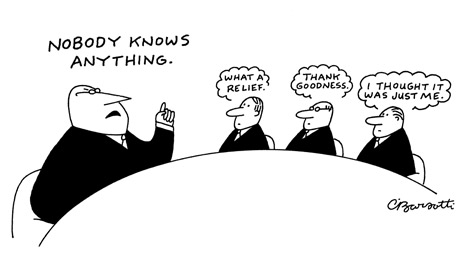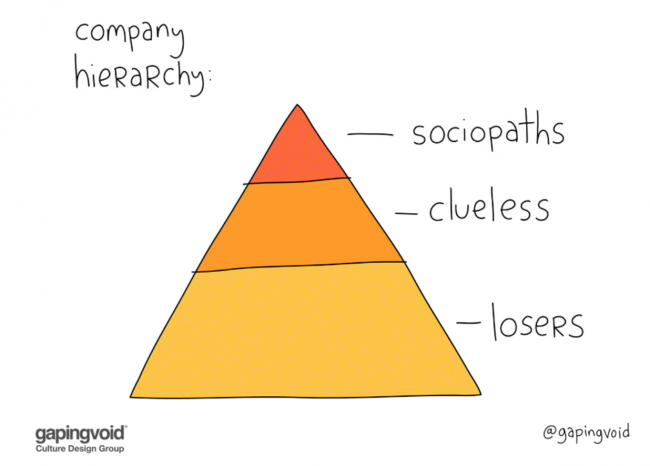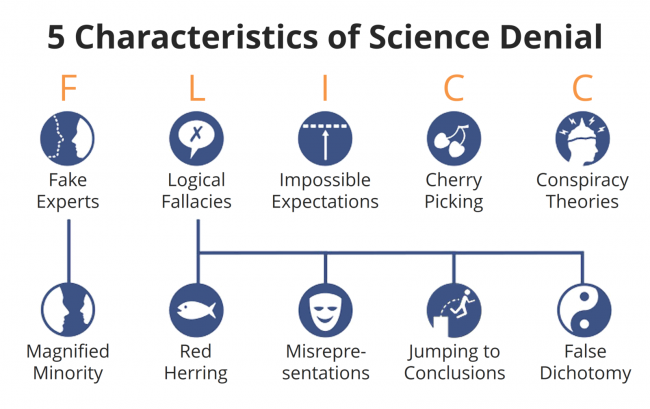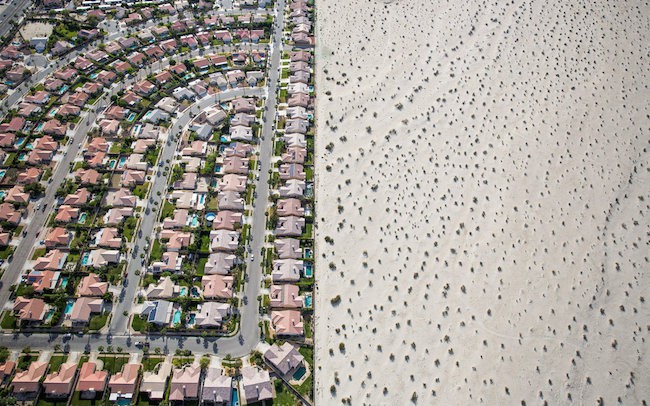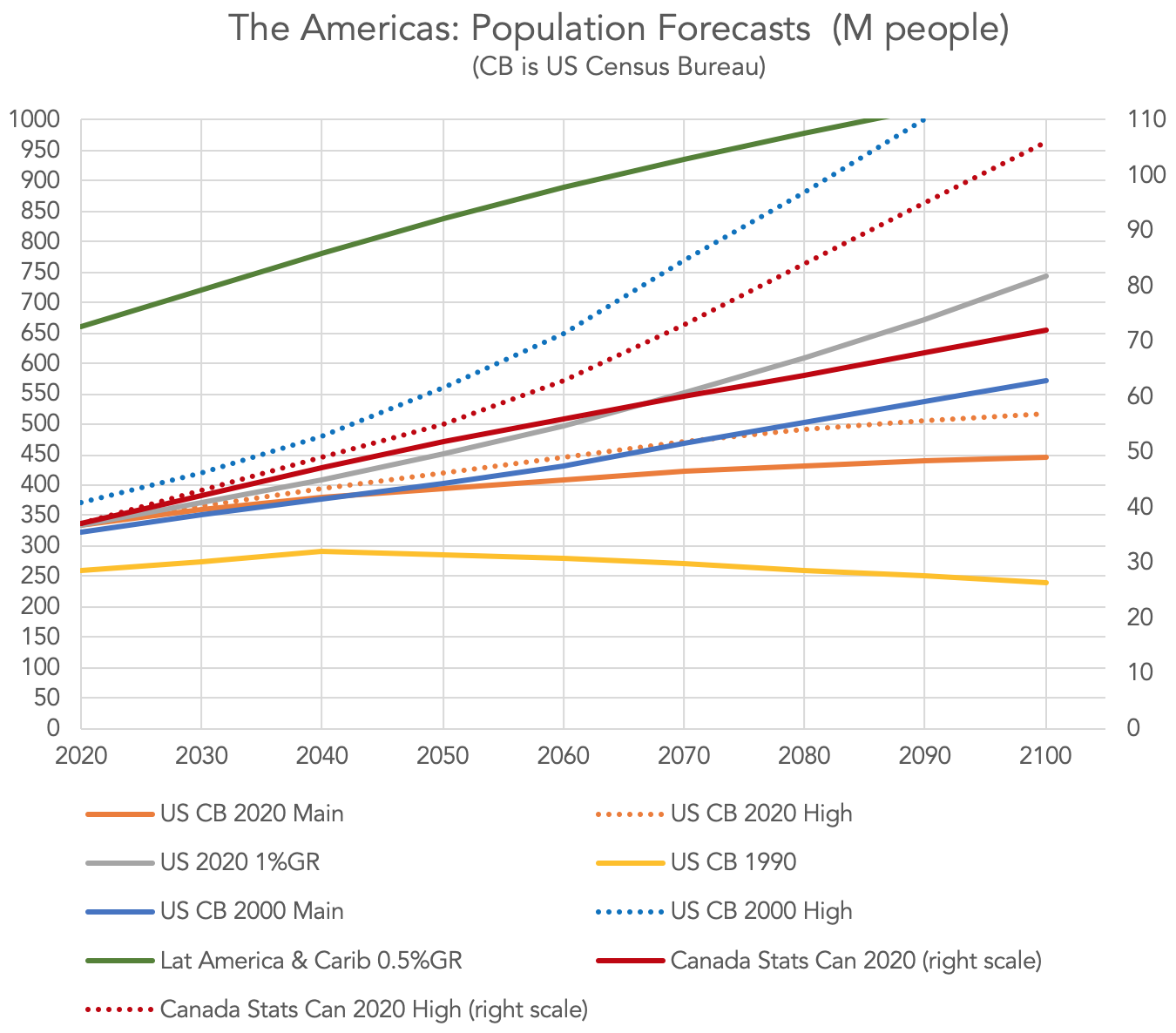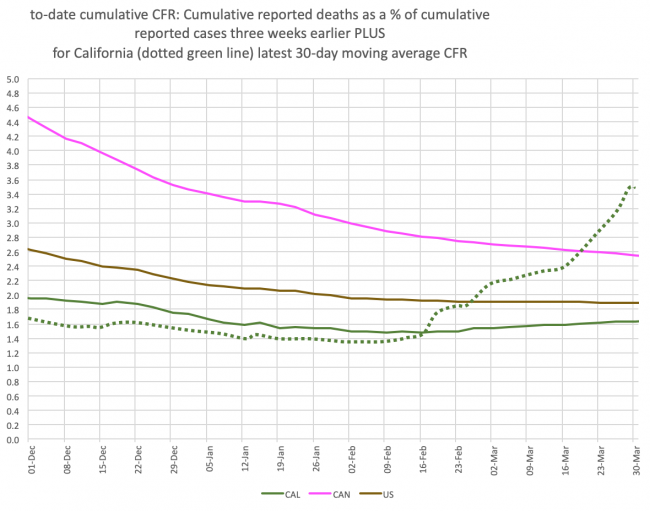Well, what can we say? Biden continues to bomb and starve millions of women and children in Yemen, through its corrupt Saudi proxies. Israel tries to sabotage Iran’s nuclear facilities, again, to try to foment a US-Iran war. Biden sabre-rattles and warmongers against China, reading CIA- and defense-industry-scripted propaganda without batting an eyelash. Conservative governments roll back pandemic protections just as variants we don’t know anything about are soaring. And carbon emissions are “roaring” back to accelerating pre-CoVid-19 levels. What could possibly go wrong?
This month, for those without the time or patience to wade through all my links, I am *** highlighting in yellow the three or four I think are most worthwhile checking out.
COLLAPSE WATCH
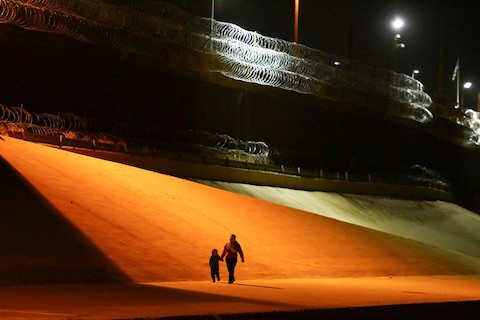
A mother and her son, migrants from Honduras, walk after crossing the Rio Bravo river to turn themselves in to U.S Border Patrol agents to request for asylum in El Paso, Texas, U.S., as seen from Ciudad Juarez, Mexico, March 29, 2021. REUTERS/Edgard Garrido TPX in The Atlantic, whose Photos of the Week are well worth checking out
“We are all going extinct”: Deena Metzger writes: “The animals know this and now all humans know this as well. Sensing the imminent death of all species, the cellular understanding of our common fate is making us ill. Our nervous and physical systems cannot bear this terrible knowledge. The growing understanding of the reality of the human caused 6th Extinction is resulting in Extinction Illness… And so, we, entirely crazed, become a species that commits ecocide even as we die of it.”
*** All we have left unsaid: Kristina M Anding, writing in the extraordinary women’s cooperative ecocollapse journal Dark Matter: Women Witnessing: ”
At schools, libraries, summer camps and my home studio, I encourage participants, particularly the children, to engage their active imaginations and really feel what it would be like to be these [endangered] animals: how they move, swim, fly, how they occupy their habitats, how they raise their babies. While we might have a group discussion before or after the activity, while we are painting, we mostly say very little to each other. We are listening to the animals and speaking back to them with each sweep of the brush. It is a chance to move beyond “awareness” of the overwhelming issue of species loss to personal connection with these beings as relatives, sensing their likeness to us. And we do this together. When people do speak during painting, they often quite matter-of-factly express grief… This is what matters.
LIVING BETTER
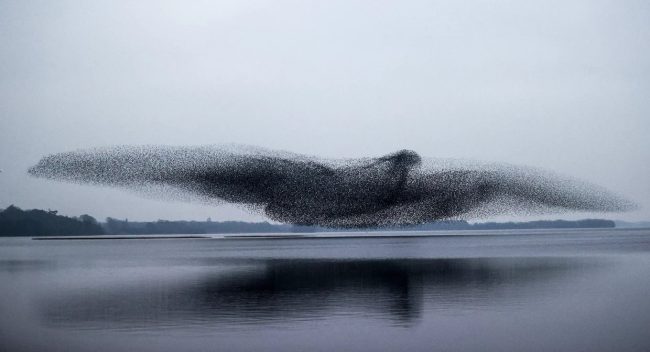
a murmuration of thousands of starlings briefly takes the form of a giant bird; photo by James Crombie on Loch Ennell, Eire
Illness as metaphor: Zeynep Tüfekçi explains how, and perhaps why, we have often treated illness as a sign of weakness or failure (eg lung cancer ~ stupid, weak smoking, and lately CoVid-19 illness ~ obesity, poor life habits, and “reckless” behaviour). This of course touches not only on the issue of whether we have control over our lifestyles, but also on addictions and free will. Her message, of course, is that not only is victim-blaming unfair, it doesn’t work.
*** I spent my life consenting to touch I didn’t want: Melissa Febos’ harrowing and courageous confessional describes how our culture subversively and systemically forces women, their whole lives long, to consent to unwanted predatory male behaviours, and actually enables and encourages such behaviours in males. An astonishing and disturbing wake-up call for us all. Thanks to Tree Bressen for the link.
Why most effective activism is local: The always-insightful Andrew Nikiforuk interviews Ian Gill of Salmon Nation, a Pacific Northwest collaborative that coordinates local activism in the Cascadia region, on what works and what doesn’t in building resilient local economies.
The remarkable discoveries of Cecilia Payne: Snopes investigates Cecilia Payne’s discoveries, a century ago, about the nature of matter in the universe, many of which were attributed to male scientists. She passes the investigation with flying colours, and with an appreciation of the additional nuances, actually proves to be an even more extraordinary scientist.
Forgiving the world’s debts: Ty Joplin outlines the compelling arguments for a massive global “Jubilee” of debt forgiveness. Unfortunately, since the wealth would have to come from the wealthy to make it happen, it’s not likely to happen.
Work from anywhere: The Nationwide building society (a UK member-owned credit union-like financial institution) is telling its workers that, even after CoVid-19, they can work from wherever they think they can best achieve their objectives. Thanks to Tree Bressen for the link, and the one that follows.
Reparations for Linnentown: The struggle for recognition and compensation for the victims of forced expropriation and eviction in Athens, Georgia is finally paying off.
POLITICS AND ECONOMICS AS USUAL


now that the disturbed RFK Jr has been banned by FB and other sites due to his endless barrage of misinformation and discredited conspiracy theories about CoVid-19 and vaccines, he is seemingly relying on the once-lucid Charles Eisenstein to be his shill; really sad to see
Using the Uyghurs as hostages: Just as alleged atrocities against Kuwaitis were used to justify the first war against Iraq (the reports were later found to be false, a scripted PR stunt by Hill & Knowlton), now alleged genocide against Uyghurs is being used to threaten war with China. And once again, the reports are false. And the group behind them turns out to be known neocon extremists fronted by a fake university. Nevertheless the media ran with the reports without checking their facts. Thanks to Caitlin Johnstone for the link. Caitlin provides a mind-blowingly scary quote from Biden in response to the reports, that is absolutely Trumpian:
[I have] made it clear that no American president, at least one did, but no American president had ever backed down from speaking out of what’s happening in the Uyghurs… So I see stiff competition with China. China has an overall goal, and I don’t criticize them for the goal, but they have an overall goal to become the leading country in the world, the wealthiest country in the world and the most powerful country in the world. That’s not going to happen on my watch because the United States is going to continue to grow and expand.
Yemen slides further into famine and chaos: Heavily funded and armed by Canada, the US and the EU, the Saudi proxy war with Iran in Yemen gets ever-worse. The country is largely in ruins, with 3/4 of its 30 million people now suffering from malnutrition and beginning to die in huge numbers of starvation and rampant diseases. The photos, of a country that has “fallen off a cliff” are gut-wrenching. And still it goes on, barely reported in the corporate-owned media across the political spectrum.
When economists don’t understand what wealth is: The textbooks that underlie modern economic thinking are still simplistic and formulaic, and out of touch with how the world, and the economy, really work. No wonder market fundamentalists get everything so often, and so completely, wrong. “They do not realize that, the greater the inequality, the less true it is that ‘the price someone can afford to pay’ constitutes ‘the relative value they place on the item’.” Thanks to Jae Mather for the link. On a similar note, Caitlin Johnstone explains how money is simply an agreement that can be changed quickly to redistribute wealth more equitably, if only there was political will to do it.
Trevor Noah on the Atlanta mass shooting: A short and moving video explains that “we should have seen this coming”. Canadian viewers have to watch this link instead. Because of bewildering IP laws, those in other countries will have to Google it, since YouTube now blocks TV programs that are not domestic. Thanks to Kelly Gavin for the links.
Catching the US tax cheats: The IRS estimates that well over a trillion dollars in taxes are not being collected because (mostly extremely wealthy) taxpayers are simply not declaring over half of the income that is not tracked on 1099 forms. The NYT editorial board proposes that all banks be required to submit 1099-like forms on the net inflows to all accounts, and that rich taxpayers identify any non-taxable inflows and pay tax on the rest. Of course, with IRS funding and staffing less than it was in the 1950s, and money pouring out of the country to tax havens, that will only go so far to solving the massive tax fraud that is exacerbating wealth inequality in the US.
Biden restarts the “War on Drugs”: Biden has called for immediate resumption of massive aerial spraying of most of Colombia with the toxic and environmentally ruinous carcinogen glyphosate (Monsanto RoundUp) in a reboot of Bush’s “war on drugs”.
Biden signals support for Israel’s continuing occupation and annexation of Palestinian lands and apartheid: As usual, using “anti-semitism” as an all-purpose sledgehammer against any critics, Israel has pressured western nations to support its blatantly apartheid administration and its occupation and annexation of most of Palestine. The doddering Biden has now fully given his “ironclad” support to this continuing malfeasance.
A little experiment in (unconscious?) sexism and misogyny: Two co-workers who share a corporate inbox and whose identical jobs require them to deal with customer inquiries and complaints via email, decided to swap identities for a while to see whether customers’ behaviour changed based on their perceived gender. The results were revealing. Thanks to Bob Lasiewicz for the link.
Planet farm: New research suggests we have not entered an anthropocene age as much as an era of Planet Farm, with most of the habitable planet given over to industrial agriculture, with disastrous consequences. “Deforestation and development are increasing the rate – and taxonomic scope – of pathogen spillover from wildlife to food animals and the labourers who tend them… Intensive operations are so inundated with circulating avian and swine influenza that they now serve as the primary reservoirs for new strains… in industrializing meat production, global agribusiness is also industrializing the pathogens that circulate among its livestock and poultry.” Thanks to Paul Heft for the link.
Canada’s misogynous military: A series of scandals of long-standing, large-scale sexual and other abuse by leaders and members of Canada’s military and police forces against women in their ranks, has tarnished the image of the wannabe feminist Prime Minister. It’s pretty clear he’s known about it all along, just not wanted to.
Canada’s other disastrous megaproject: If the tripling of the cost of building the ill-designed, unneeded and environmentally ruinous Site C hydro dam in BC wasn’t lesson enough, now a research study suggests that the half-built Kinder Morgan pipeline the federal government foolishly paid billions for a few years ago, will also cost more than twice what it was supposed to cost to complete, and it’s also unneeded and environmentally ruinous. But we never learn.
Nightmare at the US/Mexico border: Cecilia Muñoz, Biden’s choice to clean up the immigration mess made by Trump, has acknowledged that “our immigration system is broken from top to bottom“, that it will take years to undo Trump’s damage and recreate the immigration management infrastructure Trump dismantled, and that there are “unrealistic expectations among immigration opponents and immigrant advocates alike”. In other words, it’s going to get much worse before it, hopefully, starts to get better.
COVID-19 CORNER
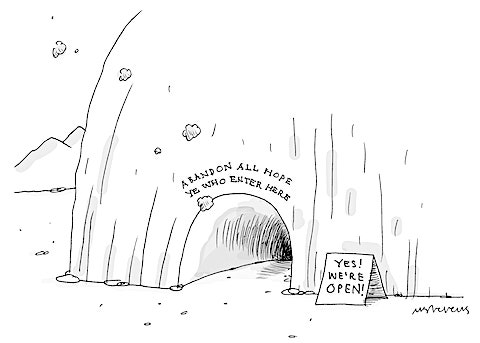
cartoon by Mick Stevens in The New Yorker
Gambling on vaccines: As I wrote earlier, North America and Europe have seemingly gone “all in” on expecting high vaccination rates to keep CoVid-19 hospitalization and death rates at politically acceptable levels while hastily dismantling safety restrictions. The new variants might well make that a really bad gamble. With the additional problem of vaccines being extremely unfairly and unequally distributed, the needed major clampdown to reduce new variant spread is simply not happening. Even areas that managed the second wave reasonably well have badly fumbled response to the third, with cases in many areas at record highs. And studies have shown we continue to do inadequate surveillance and testing, fail to follow and test plans, respond too slowly and tepidly, underestimate risks, fail to enforce mandates, and provide inadequate alerts. Bottom line: When the next pandemic hits, we will again not be ready and again rely on vaccines to “fix” the emergency.
Still unmasked indoors: Research overwhelmingly indicates that CoVid-19 cases correlate precisely with the degree of lengthy, indoors, unmasked activity of the populace. Yet still governments, pandering to pressure from right-wing voters, are opening their jurisdictions up to more and more such activities.
You can’t compromise with a virus: Excellent CBC summary of how well-intentioned politicians, trying to walk the line between pandemic control and citizen freedoms, have produced a compromise that is in some ways the worst of all worlds. Applying political solutions to public health problems is simply a recipe for disaster.
The latest on excess deaths: For the first six months of the pandemic, in most jurisdictions the number of reported “excess deaths” (total deaths from all causes less average total deaths from all causes in recent years) was running about 50% higher than reported CoVid-19 deaths. Partly because of “catch-up” reporting and partly because of better reporting and awareness, it’s now estimated that actual CoVid-19 deaths are only about 20% higher than reported deaths. Very approximate, but useful to know. In fact that’s close to the 17% number IHME has been adding to its “global” death counts to account for known undercounting. I should also note that the NYT continues to have excellent CoVid-19 maps and charts, though they are sadly and infuriatingly buried behind a double paywall/subscription wall that is getting ever-harder to work around. The fact that this important data isn’t shared freely and easily during a pandemic is shameful.
FUN AND INSPIRATION
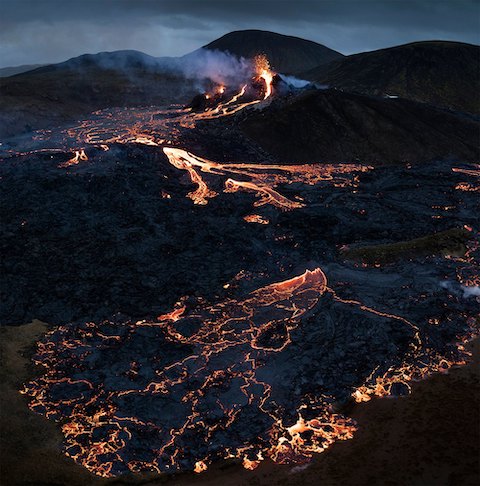
Iceland volcano last week, source not cited. Here’s a live video of the volcano (though camera just went dead 23h Apr 11th)
Skateboarding in a pink dress: Six-year old Paige Tobin has been skateboarding for half her life. She also surfs. Girls are tough in Oz. Thanks to Alice MacGillivray for the link.
*** Why animals don’t get lost: Kathryn Schulz deserves another Pulitzer for this staggeringly informative and fascinating study of the world of animal migration, navigation and place-finding. It’s long, but contains a book’s worth of new and surprising knowledge, ideas and insights. Grab a glass, settle in, and enjoy.
The right to protest and offend: Jonathan Pie passionately explains how well-intensioned laws that prohibit us from offending others are innately Orwellian forms of (almost always unreasonable and stifling) censorship.
From thought, to idea, to thing in the real world: In which Hank Green contemplates how important things get done.
Ralph Fiennes to tour one-man show of Eliot’s Four Quartets: Damn I would like to see this. If you’re in the UK this summer and catch it, tell me what you think. I think Ralph has just the voice and intonation to pull this off. Imagine learning it all by heart! Thanks to Paul Heft for the link.
Beaverton headlines of the month: (ask a Canadian if you don’t get the joke)
-
- Alberta Premier Jason Kenney, unveiling new Creationist curriculum, insists dinosaurs belong in government, not in the classroom
- Canada to distribute remaining vaccines through “Roll up the Rim to Win” contest
- Netflix adds ‘movies set in New York but it’s obviously Toronto’ category
- Jordan Peterson is back after someone mistakenly fed him after midnight
RADICAL NON-DUALITY AND NO-FREE-WILL STUFF
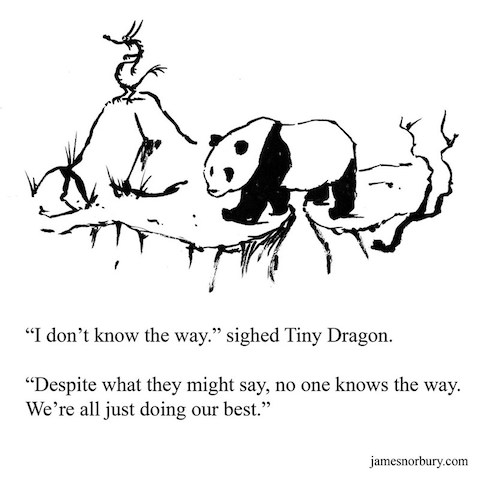
cartoon by James Norbury
Best radical non-duality talks of the month:
THOUGHTS FOR THE MONTH

image from many places on the Internet; original source unknown
*** For women who are difficult to love: The brilliant Warsan Shire reads her stunning poem For Women Who Are Difficult to love, and it’s masterful. Her ability to parse the words and phrases, her voice tone, her pauses — this is what great poetry reading is about. The video captions the words, one phrase at a time, which adds to the momentum. It’s a great poem with an important message, and definitely not just for women.
At Mt Auburn Cemetery: An astonishing new poem from Robert Pinsky:
Walking among the graves for exercise
Where do you get your ideas how do I stop them
Looking for Mike Mazur’s marker I looked
Down at the grass and saw Stanislaw Baranczak
Our Solidarity poetry reading in Poznan
Years later in Newton now he said I’m a U.S.
Liberal with a car like everybody else
When I held Bobo dying in my arms
His green eyes told me I am not done yet
Then he was gone when he was young he enjoyed
Leaping up onto the copy machine to press
A button and hear it hum to life and rustle
A blank page then another out onto its tray
Sometimes he batted the pages down to the floor
I used to call it his hobby here’s a marble
Wicker bassinet marking a baby’s grave
To sever the good fellowship of dust the vet’s
Needle first a sedative then death now Willie
Paces the house mowling his elegy for Bobo
They never meow to one another just to people
Or to their nursing mother when they’re small I
Marvel at this massive labelled American elm
Spreading above a cluster of newer names
Chang, Ohanessian, Kondakis joining Howells,
Emerson, Parkinson and here’s a six-foot sphere
Of polished granite perfect and inscribed Walker
Should I have let him die his own cat way
Bruce Lee spends less on a stone than Schwarzenegger
The cemetery official confided what will mark
The markers when like mourners they bow and kneel
And topple down flat to kiss the very heaps
They have in trust under the splendid elm
Also marked with its tag a noble survivor
Civilization lifted my cat from the street gave him
A name and all his shots and determined his death
Now Willie howls the loss from room to room
When people say I’m ashamed of being German
Said Arendt I want to say I’m ashamed of being
Human sometimes when Bobo made the machine
Shoot copies of nothing I crumpled one he could chase
And combat practicing the game of being himself.
